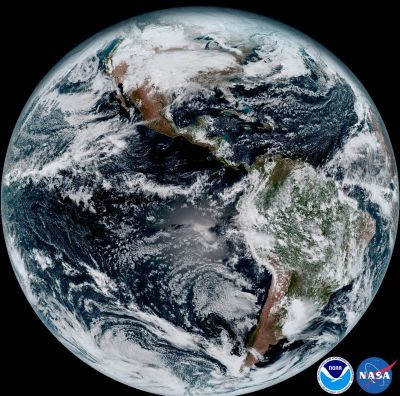The Age of the Earth Is God's Business

While Christians agree on the doctrine of the Trinity and the Gospel message of salvation, there is disagreement over various secondary issues such as the age of the earth. Some believers think the earth is only about 6000 years old, while many other Christians believe the earth appears to be much older and was created by God before "time" as we know it began.
And while the Bible is not a science textbook, it does give us plenty of historical markers upon which to hang our hat. For example, Adam was 130 years old when he fathered Seth. The genealogies and timeline of the Old Testament reveal that Christ was born in Bethlehem roughly 4000 years after God created Adam and Eve. Biblical theology is rooted in biblical history, and the Holy Spirit placed both theology and history within Scripture. Thankfully, "all Scripture is God-breathed." (2 Tim. 3:16)
The first verse of Genesis informs us: "In the beginning God created the heavens and the earth." Likewise, the apostle John delivered this foundational truth in the first few verses of his Gospel: "In the beginning was the Word, and the Word was with God, and the Word was God. He was with God in the beginning. Through Him all things were made; without Him nothing was made that has been made." (John 1:1-3)
So Jesus created it all "In the beginning." But when was that? Well, the answer to this question is God's business. It is like asking, "When did God create the angels?" I suppose the best answer to both questions is that God created the earth, the universe and the angels before "time" began. In other words, He created them in eternity past so to speak. Since God is eternal, everything He does happens in eternity.
Jesus said, "I am the Alpha and the Omega, the first and the last, the Beginning and the End." (Rev. 22:13) Now this is very interesting. We tend to assume "the Beginning" can only be referring to a point in time, but Christ expands our understanding of reality by using this title for Himself. And as "the Beginning," Jesus is the author of time and space, heaven and earth, men and angels.
Christ created everything and Christ transcends everything. The entire Bible describes what it means to be "in Christ," that is, in the One who is "the Beginning." As John Stott noted, the expressions "in Christ," "in the Lord," and "in Him" occur 164 times in the letters of Paul alone, and are indispensable to an understanding of the New Testament.
Paul also penned these words under the inspiration of the Holy Spirit: "For by Him (Christ) all things were created: things in heaven and on earth, visible and invisible, whether thrones or powers or rulers or authorities; all things were created by Him and for Him. He is before all things, and in Him all things hold together." (Colossians 1:16,17)
As I indicated in a short ebook I wrote entitled, "Open-Ended Creationism," there have been few leaders in the past century who have publicly promoted creationism more than William Jennings Bryan. It's been nearly a century since Bryan argued the famous case against evolution in the "Scopes Monkey Trial." When pressed by Clarence Darrow, Bryan sincerely stated that he didn't know the age of the earth. In fact, Bryan often shared this insight: "It is better to trust in the Rock of Ages than to know the age of rocks." Bryan understood the big picture, and he knew how to advance the biblical teaching of creation without getting hung up on unnecessary tangents.
John Lennox is Professor of Mathematics at the University of Oxford, and he is also a Christian apologist. Lennox declared, "People feel that the Bible is unequivocal in stating that the age of the earth is very young and so on and so forth, and so the big things get lumped together with the lesser things. And the age of the earth is for example virtually made a touchstone of doctrine, when there's so much evidence out there in science against it."
Regardless of your interpretation of the scientific data, the fact remains that the Bible is not a science textbook. It is a book of theology, history and absolute truth.
Norman Geisler wisely pointed out: "The young earth view has never garnered an important, let alone a crucial role in the history of the Church." Geisler explains why believing in the inerrancy of Scripture does not require one to believe in a young earth.
And let's never forget this key principle of biblical interpretation: "Scripture interprets Scripture." Therefore, John 1:1 helps us interpret Genesis 1:1, and vice versa. "In the beginning" points to a realm outside of time. And the minute you become dogmatic in trying to equate "In the beginning" with a finite number of years, you are treading on very thin ice.
Martin Luther said, "The Bible is the cradle wherein Christ is laid." All of Scripture points to the Messiah and to God's plan of salvation. "History" revolves around His story, which of course explains why "Jesus Is the Superstar of Creation."
When compared to Christ Himself, the age of the earth is small potatoes. It is one of those mysteries that remain hidden in "the deep things of God," (1 Cor. 2:10) and so there is no need to get too worked up over it. After all, Christ-followers don't understand every mystery of the universe. Nevertheless, we are simply called to love, worship and serve the One who is the Way, the Truth, the Life, the Beginning and the End.





















